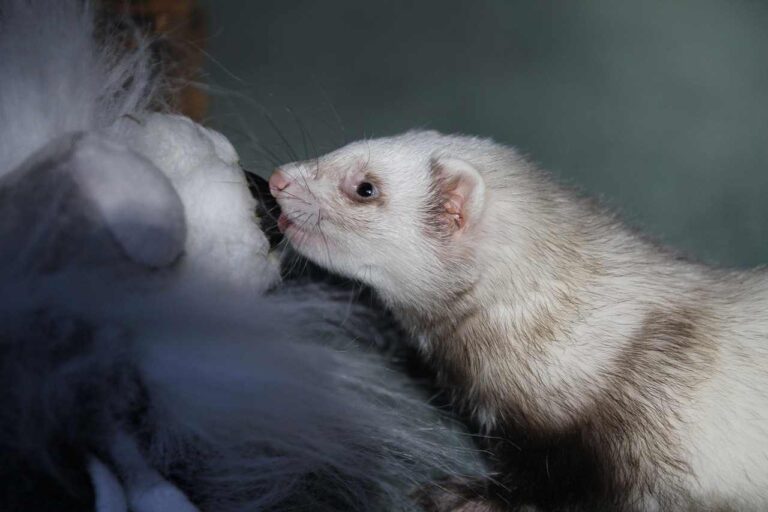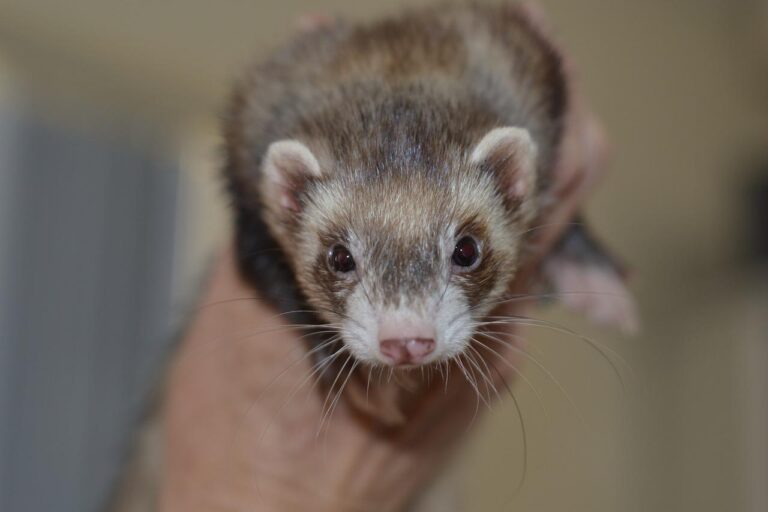10 Reasons Why Ferrets Stink With Remedies
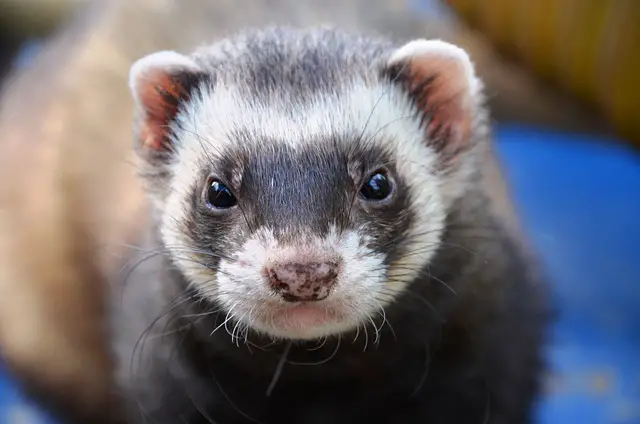
Today, let’s tackle a topic that might make you wrinkle your nose: Why ferrets stink? We all adore these furry little creatures, but sometimes their unique odor can be a bit overwhelming.
But fear not, because, in this blog post, we’ll uncover the reasons behind that distinctive smell and share some handy tips to keep your ferret smelling fresh as a daisy.
So, let’s dive in and decode the mystery of why ferrets stink, shall we?
The Natural Ferret Musk
Ferrets possess musky scent glands located near their anus. These glands secrete a pungent odor that serves multiple purposes in the wild. Firstly, the musky scent acts as a form of communication between ferrets, allowing them to mark their territory and establish dominance.
Secondly, the scent acts as a defense mechanism, deterring potential predators by emitting a strong and unpleasant odor. Additionally, the musky scent can be used for hunting purposes, as it helps ferrets locate prey and navigate their environment.
Moreover, the scent glands play a role in mating rituals, with both males and females using their scent to attract potential mates. Lastly, the musky scent may also serve as a form of identification among individuals within a ferret community.
Overall, the presence of musky scent glands in ferrets is a crucial adaptation that aids in communication, defense, hunting, mating, and social dynamics in the wild.
Why Ferrets Stink
Ferrets have a musky odor due to the presence of scent glands, these glands produce oils that help them mark their territory and communicate with other ferrets.
Additionally, ferrets have a unique digestive system that can contribute to their odor. Regular cleaning and proper hygiene can help minimize the smell associated with ferrets.
Let’s dive deeper…
Reasons Why Ferrets Stink
The following are some of the most common reasons why ferrets stink:
1. Natural Musky Odor
The natural musky odor in ferrets is one of the most common reasons why they can emit a strong smell. This odor is produced by their sebaceous glands, which secrete oils that give off a distinct scent.
To avoid this odor issue, regular bathing of your ferret is essential. Use a ferret-specific shampoo and gently wash their coat, being careful not to get water in their ears.
In addition to bathing, keeping their living environment clean is crucial. Regularly clean their bedding, litter box, and cage to minimize any lingering odors. Providing good ventilation in their living space can also help reduce the buildup of odor.
Another practical way to address the musky odor is by neutering or spaying your ferret. This can help reduce the intensity of their natural scent. Additionally, feeding them a proper diet can contribute to minimizing their natural odor. Avoid overfeeding them with foods that are high in fat, as this can exacerbate the smell.
2. Poor Quality Food
Poor quality food in ferrets can contribute to the unpleasant odor they emit. This occurs because low-quality food lacks essential nutrients and can lead to digestive issues in ferrets, resulting in smelly feces and body odor.
To avoid this odor issue, it is crucial to feed your ferret a high-quality, protein-rich diet specifically formulated for ferrets. Additionally, providing fresh water at all times and avoiding sugary treats can help maintain their overall health and minimize odor.
Regular grooming, including bathing and brushing, can also help address and manage the smell in your ferret. Finally, ensuring a clean living environment and regular cage cleaning can help minimize odors caused by poor diet.
3. Dirty Environment
The dirty environment in ferrets is one of the most common reasons why they may have a strong odor. This occurs when their living area, such as their cage or bedding, is not cleaned regularly.
To avoid this odor issue, it is essential to clean their cage at least once a week and spot-clean any soiled areas daily. Additionally, providing them with a litter box and training them to use it can help minimize the odor.
Regularly bathing your ferret with ferret-specific shampoo and using odor-neutralizing sprays can also help address the smell. Finally, ensuring a proper diet and regular veterinary check-ups can help maintain their overall health and reduce odor.
4. Poor Ventilation
Poor ventilation in ferrets can contribute to their strong odor. This occurs when the enclosure or living space lacks proper airflow, trapping the smells emitted by the ferret’s waste and body. To avoid this odor issue, it is essential to provide adequate ventilation in the ferret’s living environment.
This can be achieved by ensuring proper air circulation through the use of fans or open windows, as well as regularly cleaning the enclosure and removing waste promptly. Additionally, providing a clean litter box and regularly bathing the ferret can help address the odor problem effectively.
5. Bathing With the Wrong Products
Bathing with the wrong products in ferrets is one of the most common reasons why they stink. This occurs when owners use harsh or scented shampoos that strip the natural oils from the ferret’s skin, causing it to produce more oil to compensate.
To avoid this odor issue, owners should use a mild, fragrance-free shampoo specifically formulated for ferrets. Additionally, it is essential to avoid over-bathing, as excessive bathing can lead to dry skin and increased oil production.
Regular brushing and providing a clean environment are also practical ways to address the odor issue in ferrets.
6. Ear Infections
Ear infections in ferrets can contribute to the unpleasant odor they emit. This happens because the infection causes a buildup of wax, debris, and bacteria in the ear canal, leading to a foul smell. To avoid this odor issue, it is important to regularly clean your ferret’s ears and keep them dry.
Gently wipe the outer ear with a damp cloth, avoiding the inner ear. If the odor persists or you suspect an infection, consult a veterinarian who can prescribe appropriate medication and provide guidance on ear care. By taking these preventive measures and seeking professional help when needed, you can address the issue of ear infections and minimize the stinky odor in your ferret.
7. Dental Problems
Dental problems in ferrets can contribute to their unpleasant odor. This occurs when dental issues, such as tartar buildup, gum inflammation, or tooth decay, lead to bacterial growth in the mouth. The bacteria produce foul-smelling compounds, resulting in a stinky odor.
To avoid this issue, it is crucial to provide proper dental care for your ferret, including regular brushing, appropriate chew toys, and a balanced diet. If your ferret already has dental problems, consulting a veterinarian for a dental cleaning or extractions may be necessary to address the odor and improve their oral health.
8. Inadequate Bathing or Bathing too frequently
Inadequate bathing or bathing too frequently can contribute to the stinky odor in ferrets. When ferrets aren’t bathed regularly, their natural oils and dirt build up on their fur, leading to an unpleasant smell. On the other hand, over-bathing can strip off the natural oils, causing the skin to produce more oil, resulting in a stronger odor.
To avoid this issue, it is recommended to bathe ferrets once every few months or as needed, using ferret-specific shampoo. Regularly cleaning their bedding, litter box, and living area can also help minimize odor. Additionally, maintaining a healthy diet and providing proper grooming, such as brushing their fur, can contribute to reducing the smell.
9. Poor Grooming Habits
Poor grooming habits in ferrets can be one of the most common reasons why they develop a strong odor. This occurs because ferrets have scent glands that produce a musky odor, and if they don’t groom themselves properly, the odor can become more prominent.
To avoid this issue, regular bathing and grooming are essential. It is important to use ferret-specific shampoos and avoid over-bathing, as this can strip their natural oils and lead to dry skin.
Additionally, providing a clean and hygienic living environment, including regularly washing bedding and cleaning their litter box, can help minimize the odor. Finally, a balanced diet and proper dental care can also contribute to a healthier coat and reduced odor in ferrets.
10. Health Issues
Ferrets have a distinct odor due to their scent glands, which are more active in males. Health issues can contribute to the intensity of this smell. One common health issue is adrenal gland disease, which can cause an increase in oil production and a stronger scent.
To avoid this odor issue, regular veterinary check-ups are crucial to catch any health problems early on. Addressing the odor can involve bathing your ferret regularly with ferret-specific shampoo, providing a clean and well-ventilated living environment, and ensuring a balanced diet. Additionally, neutering male ferrets can help reduce the intensity of their scent.
How to Address Bad Odors in Ferret
To instantly address bad odors in ferrets, there are several steps you can take. First, ensure that the ferret’s living environment is clean and well-maintained. Thoroughly clean their cage and litter box to remove any waste or odor-causing substances.
Second, bathe your ferret thoroughly using a ferret-specific shampoo to keep their fur clean and odor-free. Third, consider using odor-neutralizing products, such as ferret-safe sprays or deodorizers, to eliminate any lingering smells.
Fourth, provide a proper diet for your ferret, as certain foods can contribute to strong odors. Finally, monitor your ferret’s health and address any underlying medical conditions that may be causing the odor.
By following these steps, you can help keep your ferret smelling fresh and clean.
How to Reduce and Manage Ferret Smell
While it is impossible to completely eliminate the natural scent of a ferret, there are several practical home remedies that can help reduce and manage the smell.
Here are some suggestions:
Regular Bathing: Bathing your ferret regularly can help keep their coat clean and reduce odor. However, it is important not to over-bathe them, as excessive bathing can strip their skin of natural oils and cause dryness. Aim to bathe your ferret once every few months or as needed.
Proper Cage Cleaning: Keeping your ferret’s living environment clean is crucial in managing odor. Regularly clean their cage, litter box, and bedding to remove any waste or urine. Use pet-safe cleaning products and ensure proper ventilation in the area.
Litter Box Maintenance: Ferrets are litter-trained animals, and maintaining a clean litter box is essential. Scoop the litter box daily to remove waste and replace the litter regularly. This will help minimize odor in their living space.
Air Fresheners and Deodorizers: Consider using pet-friendly air fresheners or deodorizers specifically designed to neutralize pet odors. Be cautious when using these products and ensure they are safe for ferrets.
Proper Diet: A balanced and appropriate diet can contribute to reducing ferret odor. Consult with a veterinarian to ensure you are feeding your ferret a high-quality, species-appropriate diet. Avoid feeding them foods that are high in carbohydrates or contain excessive amounts of fish, as these can contribute to a stronger odor.
Grooming: Regularly brushing your ferret’s coat can help remove loose hair and reduce odor. Use a soft brush or grooming mitt to gently brush their fur.
Proper Ventilation: Ensure that the area where your ferret spends most of their time has proper ventilation. Good airflow can help reduce the concentration of odor in the environment.
It’s important to note that while these remedies can help manage ferret odor, some level of scent will still be present.
If you find that the odor is particularly strong or persistent, it may be worth consulting with a veterinarian to rule out any underlying health issues that could be contributing to the smell.
How to Prevent Ferrets From Smelling
To prevent ferrets from smelling, it is important to focus on their hygiene. First, regularly clean their living area, including their cage and bedding, to remove any odor-causing waste.
Second, bathe your ferret using a ferret-specific shampoo every few months to keep their fur clean and odor-free.
Third, clean their ears regularly to prevent wax buildup. Fourth, provide a high-quality diet that is appropriate for ferrets, as their food can affect their body odor. Lastly, spaying or neutering your ferret can help reduce their musky scent.
Read more about identifying a sick ferret.
Frequently Asked Questions
Why do ferrets have a distinct odor?
Ferrets have a unique musky scent that can be quite strong. This odor comes from their scent glands, which are located near their anus. These glands produce a secretion that helps them communicate, mark their territory, and recognize other ferrets. While some people find the smell unpleasant, others enjoy it as a distinctive characteristic of these adorable creatures.
Can the smell of ferrets be reduced or eliminated?
Yes, there are ways to manage and minimize the odor associated with ferrets. Regular bathing is crucial to keep their fur clean and reduce the scent. However, it’s important not to over-bathe them, as it can strip away their natural oils and lead to more odor. Additionally, maintaining a clean living environment, including litter boxes, bedding, and toys, can help control the smell. Some ferret owners also use specialized products, like ferret-specific deodorizers or sprays, to help mask the scent.
Is there a difference in odor between male and female ferrets?
Yes, there can be a slight difference in odor between male and female ferrets. Unaltered male ferrets, also known as hobs, tend to have a stronger scent due to their higher production of hormones. Neutering or spaying your ferret can help reduce this odor, as it eliminates the hormones responsible for the stronger smell. Female ferrets, known as jills, may also have a distinct scent during their mating season, but it is generally less potent.
Are there any health issues linked to the odor of ferrets?
No, the natural odor of ferrets is not necessarily indicative of any health issues. However, if you notice a sudden change in your ferret’s scent, such as an extremely foul smell or an unusually strong odor, it may be a sign of an underlying health problem. In such cases, it’s best to consult a veterinarian for a thorough examination and appropriate treatment.
Can diet affect the smell of ferrets?
Yes, the diet of a ferret can impact its scent. Feeding your ferret a high-quality, balanced diet that is appropriate for their specific nutritional needs can help reduce the intensity of their natural odor. Some ferret owners find that certain foods, such as those high in fish content, can contribute to a stronger smell. It’s always a good idea to consult with a veterinarian or a ferret nutrition expert to ensure you’re providing the best diet for your furry friend.
Are there any other tips for managing ferret odor?
Yes, in addition to regular bathing and a balanced diet, there are a few other tips to help manage ferret odor. Ensuring proper ventilation in their living space can help minimize the buildup of scent. Cleaning their bedding and litter boxes frequently, using odor-absorbing materials like activated charcoal, and maintaining good hygiene practices for both you and your ferret can also contribute to a fresher-smelling environment. Remember, a little bit of extra effort can go a long way in keeping your ferret’s scent under control.
Conclusion
In conclusion, we can’t deny that ferrets have a unique scent that some people may find unpleasant. However, it’s important to remember that proper hygiene and regular cleaning can help minimize any odor.
So, if you’re willing to put in the effort, don’t let the stink stop you from enjoying the playful and lovable nature of these adorable little creatures!

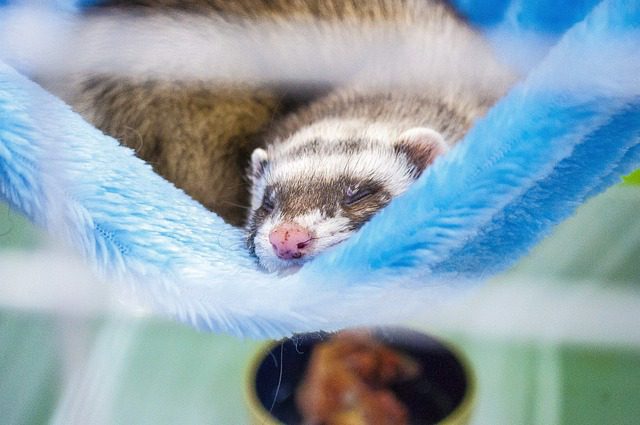
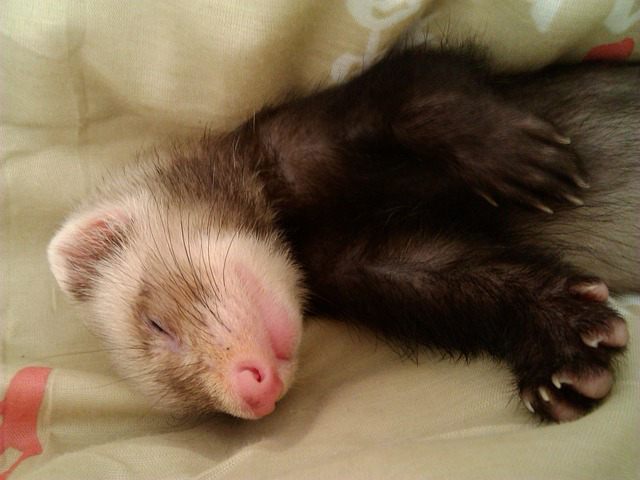

![How to Train a Ferret Not to Bite [Helpful Tips] How to Train a Ferret Not to Bite](https://petcreeks.com/wp-content/uploads/2023/12/istockphoto-177817907-612x612-1.jpg)
